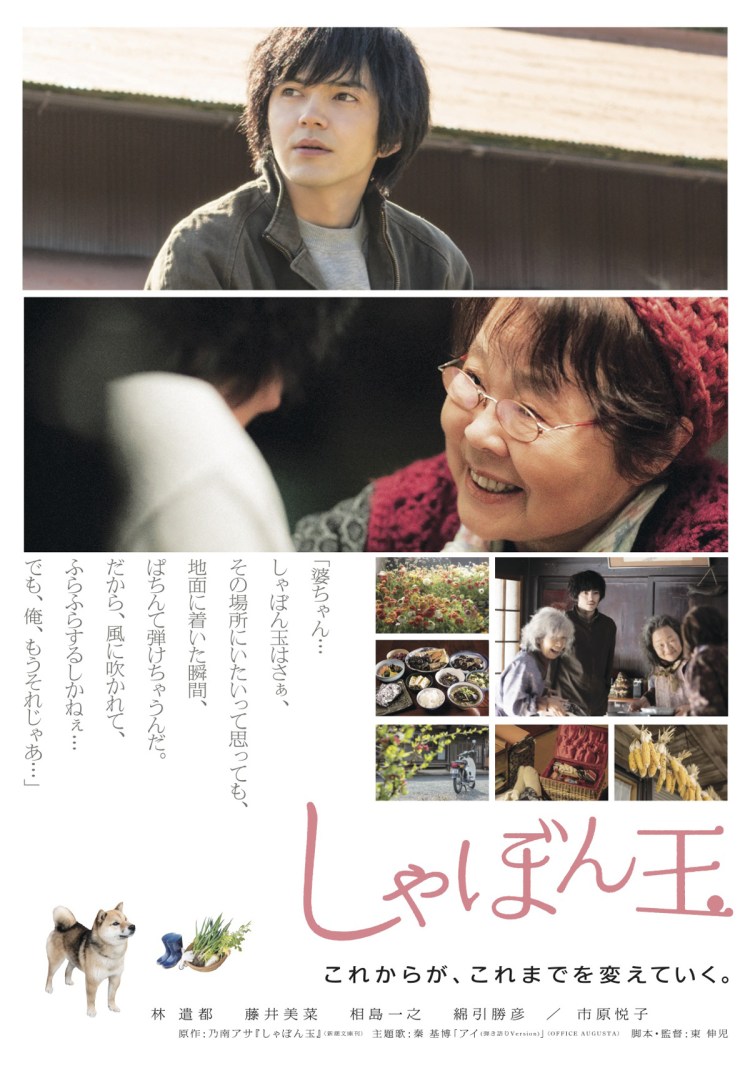 It’s important to be supportive towards your partner’s dreams, but what if your support is actually getting in the way of their development? The question itself never seems to occur to the heroine of Pumpkin and Mayonnaise (南瓜とマヨネーズ, Kabocha to Mayonnaise) as she descends deeper and deeper into a dark web of wilful self sacrifice hoping that her singer songwriter boyfriend will finally get his act together and come up with some new material. Adapted from the manga by Kiriko Nananan, Masanori Tominaga’s charting of a modern relationship is perhaps slightly more hopeful than those which have previously featured in his movies but nevertheless takes his heroine to some pretty dark places all in the name of love.
It’s important to be supportive towards your partner’s dreams, but what if your support is actually getting in the way of their development? The question itself never seems to occur to the heroine of Pumpkin and Mayonnaise (南瓜とマヨネーズ, Kabocha to Mayonnaise) as she descends deeper and deeper into a dark web of wilful self sacrifice hoping that her singer songwriter boyfriend will finally get his act together and come up with some new material. Adapted from the manga by Kiriko Nananan, Masanori Tominaga’s charting of a modern relationship is perhaps slightly more hopeful than those which have previously featured in his movies but nevertheless takes his heroine to some pretty dark places all in the name of love.
Tsuchida (Asami Usuda) is a 20-something woman living with her aspiring rock star boyfriend, Seiichi (Taiga). In order to facilitate his art, she has convinced him to give up work while she supports the couple financially through her job at live music venue. Seiichi, however, remains conflicted about the arrangement and hasn’t written anything of note in months. In fact, as Tsuchida tells a colleague, he barely leaves the house which means he’s not likely to be suddenly inspired either. What Seiichi doesn’t know is that the money from Tsuchida’s regular job isn’t quite enough and she’s started supplementing her income through working in a hostess bar. Though not naturally suited to the work, she soon picks up a “particular” client (Ken Mitsuishi) who offers her some “overtime” at a hotel. Tsuchida isn’t quite sure but having come so far she can hardly turn back now, even if the guy is a pervert with a school girl fetish. Hiding the money in a cigarette box in shame, Tsuchida is eventually caught out and forced to confess to Seiichi who is horrified, placing a serious strain on their relationship.
Just as her relationship with Seiichi starts to go south, Tsuchida runs into an old flame, Hagio, who is everything Seiichi isn’t – brash, arrogant, confident, and very much not the sort of man to make a life with. Nevertheless, Tsuchida can’t help looking back and remembering how madly in love she was with Hagio (Joe Odagiri), forgetting that she was just as madly in love with Seiichi or she wouldn’t have gone to all this trouble for his benefit. Hagio himself cites Tsuchida’s all or nothing intensity as one reason he ended the relationship the first time round, she was just too into him and he found it annoying.
Seiichi, a quieter, introspective sort, never found Tsuchida’s devotion irritating but the pressure of her expectation was perhaps a barrier to his artistic success. Staying home all day, bored and depressed, Seiichi rarely found the inspiration to write between brooding about his lack of progress and feeling guilty that he couldn’t pull his economic weight. To his credit, Seiichi harbours no particularly sexist notions towards Tsuchida’s being the family earner, but he does mildly resent a barbed comment from a friend who criticises him for his “purist” stance in accusing his former band members of selling out when he is being kept by his girlfriend. Likewise, he doesn’t reject Tsuchida for engaging in prostitution or for “cheating” on him, but turns his anger inward in resenting that she felt forced to go such great lengths for the music that he isn’t quite so confident about anyway.
The problem is that Tsuchida gets far too into her idealised notions of romance rather than directly engaging with the person in front of her. She pushed Seiichi towards music and encouraged him to fulfil his dreams but in the end stifled them with her unforgiving intensity. Likewise, she ends up over engaging in Hagio’s hedonistic, devil may care lifestyle and never really stops to think where it’s going to take her. Only near the end does she begin to approach a level of self realisation which allows her to see that her relationship with Hagio will never work out because she remains afraid to enter a true level of intimacy with him in fear that he won’t like what he sees and will leave her.
Told from Tsuchida’s perspective with frequent voice overs to let us in on her interior monologue, Pumpkin and Mayonnaise is a messy “grownup” love story between three people who are still in the process of growing up. Artistic integrity rubs up against relationship dynamics as Tsuchida is forced to examine her own behaviour and realise she often, intentionally or otherwise, sabotages her dreams by attempting to impose her own singular vision upon them rather than simply let them be. As in real life, there may not be a “happy” ending, in one sense at least, but there is still the possibility of one further down the line for a woman who’s finally accepted herself and is willing to let others do the same.
Screened at Nippon Connection 2018.
Original trailer (no subtitles)


